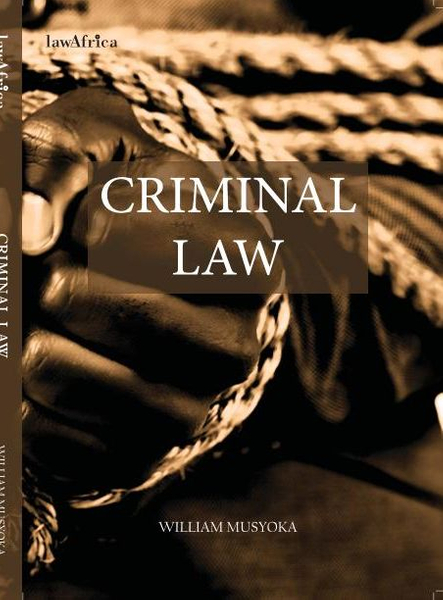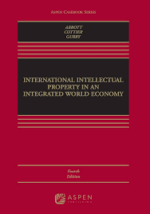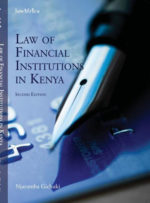This text is designed to expose the Kenyan law on criminal responsibility and to define the common and key offences created by Kenyan statutes. An attempt has been made to rely mainly on Kenyan case law, but there is reference to cases from the other East African countries and the rest of the Commonwealth. The book is meant for law students undertaking the LL.B. programme. Legal practitioners, judicial officers, law enforcement agents and other persons with an interest in criminal law and justice will also find it useful.
Criminal Law-William Musyoka
KSh 2,700.00
This text is designed to expose the Kenyan law on criminal responsibility and to define the common and key offences created by Kenyan statutes. An attempt has been made to rely mainly on Kenyan case law, but there is reference to cases from the other East African countries and the rest of the Commonwealth. The book is meant for law students undertaking the LL.B. programme. Legal practitioners, judicial officers, law enforcement agents and other persons with an interest in criminal law and justice will also find it useful.
2 in stock
Related products
-
International Intellectual Property in an Integrated World Economy (Aspen Casebook)
KSh 60,000.00International Intellectual Property in an Integrated World Economy, Fourth Edition by Frederick M. Abbott, Thomas Cottier, and Francis Gurry, provides a comprehensive treatment of the international intellectual property system across the spectrum of intellectual property rights and interests. It introduces the institutional architecture at the multilateral, regional/plurilateral, bilateral and national levels. For each form of IP, it addresses the technical legal rules and illustrative jurisprudence, as well as economic and social welfare implications. Each of the authors has played a role in the development and implementation of the international rules, and they bring their experience to bear in introducing students to the field.
New to the Fourth Edition:
- The latest developments in bilateral and regional agreements regulating intellectual property, including NAFTA 2.0 (USMCA), CPTPP, and CETA
- Important new judicial decisions, including the U.S. Supreme Court decision adopting international exhaustion of patents and CJEU decisions addressing trademarks, geographical indications, and copyright
- Developments in IP and human rights; IP and competition law; and IP and health
- The WTO panel report in the Australia-Tobacco case
Professors and students will benefit from:
- An approach to the international IP system that situates the rules within the broader context of international law and the public policy objectives that governments, industry, and interest groups are seeking to achieve
- Case law from international dispute settlement bodies, as well as from national and regional courts
- Discussion of patent, trademark, geographical indication, copyright, design, trade secret, and data protection; as well as plant variety protection, protection of genetic resources and traditional knowledge, and the role of open source
- An explanation of the new European Union Unitary Patent system
- Exploration of the increasingly important role of emerging market IP systems
- Materials to help students understand the disputes between the United States and China involving IP, investment, and transfer of technology
- Inclusion of important jurisprudential developments
-
Intellectual Property Law in East Africa
KSh 3,217.00The past half century in Uganda has witnessed both concern and interest in copyright and neighbouring rights. This is evident in the laws and treaties initiated by both the Uganda Government and the international community, aimed at enabling copyright holders to realize the benefi ts of their intellectual works.
-
Litigation-The Art of Strategy and Practice
KSh 2,614.00Litigation – The Art of Strategy and Practice is a practical guide for lawyers and law students, offering insights on case strategy, courtroom skills, and effective advocacy.
The book is not meant to be the final solution to all practical legal problems but rather seeks to provide a quick reference to the common topical issues the litigator faces in court.
-
Employment Law Guide for Employers
KSh 1,665.00The Industrial Court does in its endeavour to interpret the various sections of labour statutes. However, majority of these guidelines have not been made accessible to employers in a manner that is easily and properly understood and appreciated. This is because, even though there is an attempt to avail the decisions of the Industrial Court to the general public, the ratios and the guidelines thereof have not been analyzed in a short, concise and easier manner. This book seeks to address this gap by focusing on the realist perspective.
-
Equity and Trusts-DAVID BAKIBINGA
KSh 2,800.00The book provides an overview of equitable principles in Uganda and links this with the maxims of equity and the distinction between equitable and legal interests. The book will benefit students offering Equity and Trusts
and Estate Planning in East African universities as well as legal
practitioners, insurance, social security and corporate operators. -
CORPORATE SECRETARIAL PRACTICE IN KENYA
KSh 2,600.00Company and Secretarial Practice in Kenya Today is a practical guide to the core functions and responsibilities of a Company Secretary and, therefore, the secretarial function in the present day Kenya. This handbook covers company secretarial duties as laid down by statute, common law and good practice.
-
Law of Financial Institutions in Kenya-Njaramba Gichuki
KSh 1,500.00The law of financial institutions in Kenya is contained in statutes as well as case law. The common law of England also plays an important role in the substantive law. Banking practice is elevated to the position of law (almost). The Central Bank of Kenya has powers to make guidelines and directives for the financial sector. When this is done, they operate within the confines of the law as the same are applied under the provisions of the Central Bank of Kenya Act, the Banking Act and the other relevant Acts.
-
Principles of Constitutional Law
KSh 1,575.00The main aim of this book is to provide the reader with knowledge and understanding of some of the key concepts, doctrines and principles which make up that corpus of law known as constitutional law. Another aim is to develop a sound academic basis for the study of subjects based on public law, such as political science and international relations.










Be the first to review “Criminal Law-William Musyoka”